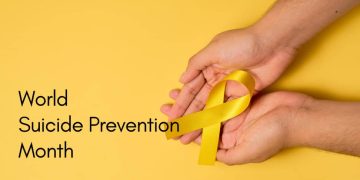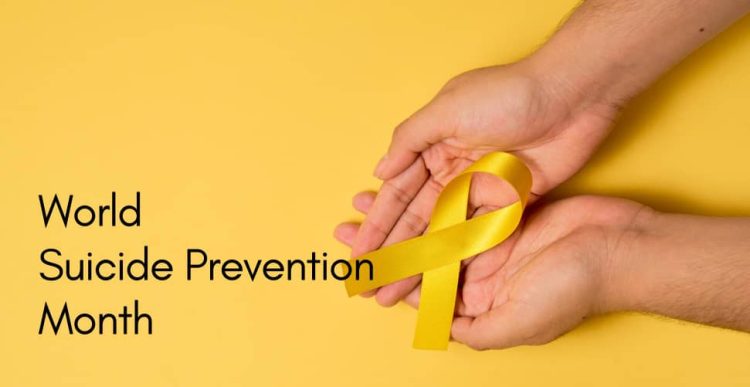By Shoonya Centre
MENTAL HEALTH REPORT
September is Suicide Awareness Month, a time dedicated to shedding light on the often-taboo topic of mental health struggles that lead individuals to contemplate ending their lives. As we come together to raise awareness, it is vital to foster open conversations, challenge stigmas, and extend support to those who may feel isolated or overwhelmed by their emotions. Suicide is a complex issue, affecting people from all walks of life, and by increasing understanding and compassion, we can offer hope and help save lives. This month, let’s focus on providing a voice for the voiceless and encouraging the belief that seeking help is a sign of strength, not weakness.

Overview
Annually, 726,000 individuals take their own lives, with many more attempting suicide. Each suicide is a heart-breaking event that impacts families, communities, and entire nations, leaving lasting effects on those who remain. Suicide can occur at any age and was the third leading cause of death among 15 to 29-year-olds worldwide in 2021, as per WHO.
Suicide is not confined to high-income countries; it is a global issue affecting all regions. Notably, nearly three-quarters (73%) of global suicides took place in low- and middle-income countries in 2021.
This critical public health issue necessitates a comprehensive public health approach. With timely, evidence-based, and often cost-effective interventions, suicides can be prevented. For national strategies to be successful, a thorough multisectoral approach to suicide prevention is essential.
Factors contribute to this crisis:
The connection between suicide and mental health disorders, particularly depression and alcohol use disorders, as well as previous suicide attempts, is well-documented in high-income countries. However, many suicides occur impulsively during moments of crisis when individuals struggle to cope with life stresses, including financial difficulties, relationship conflicts, or chronic pain and illness.

Moreover, factors such as experiencing conflict, disaster, violence, abuse, loss, and feelings of isolation are closely linked to suicidal behavior. Suicide rates are notably high among marginalized groups facing discrimination, including refugees and migrants, indigenous populations, lesbian, gay, bisexual, transgender, intersex (LGBTI) individuals, and prisoners.
Expectations and Perfectionism: Social media and societal expectations often create pressure to present a perfect life, which can lead to feelings of inadequacy when reality does not match these ideals.
Lack of Meaning and Purpose: Many struggle with finding meaning in life, especially in a world that prioritizes material success over inner fulfillment.
Mental Health Stigma: Even though mental health awareness has grown, stigma and lack of proper resources prevent many from seeking help.
The Need for Awareness
Awareness is crucial in addressing suicide. By developing a deeper understanding of oneself and the world, individuals can become more conscious of their thoughts, emotions, and the transient nature of pain. Instead of just addressing the symptoms of distress, awareness helps identify the underlying causes, such as unresolved trauma, unmet emotional needs, or existential crises.
Awareness encourages non-judgmental observation of one’s emotional states, helping individuals detach from overwhelming emotions like despair or anger.
Living in the Present Moment: A heightened state of awareness promotes mindfulness, reducing ruminating thoughts about the past or anxiety about the future, which are often triggers for suicidal ideation.
Osho believed that self-awareness and meditation are the keys to addressing the root causes of suffering. His teachings emphasized going beyond the mind, which often creates illusions of failure, hopelessness, and despair, and diving into the stillness and silence of the true self.
Here are some key aspects of Osho’s philosophy that can be helpful in addressing suicide and promoting awareness:
Going Beyond the Mind
Osho often spoke about how the mind is the source of suffering because it creates attachments to thoughts, emotions, and desires. People become trapped in cycles of negativity because they identify with their mind’s chatter. According to Osho, the mind is filled with conditioned beliefs and societal pressures, which fuel feelings of worthlessness and hopelessness.
By practicing meditation, one learns to observe the mind without attachment, which can bring clarity and peace. Meditation allows individuals to recognize that their mind is not who they truly are. By transcending the mind, a person can connect to their deeper, true self—a state of pure awareness that is untouched by external circumstances.

Meditation as a Path to Healing
Osho emphasized that meditation is not just a practice but a way of life. It is the art of being present, of becoming aware of one’s thoughts, emotions, and surroundings. When individuals face thoughts of suicide, it is often because they are overwhelmed by their thoughts and emotions. Meditation offers a way to break free from this overwhelming state by creating space between the individual and their mental state.
Some of Osho’s meditation techniques that can be beneficial include:
Dynamic Meditation:
A technique that involves intense physical activity followed by silence. It helps release pent-up emotions and energy, allowing individuals to find stillness within.
Vipassana (Mindfulness Meditation): Observing the breath and being present in the moment. This method helps individuals become aware of their thoughts and feelings without becoming attached to them.
Laughter Meditation: Osho believed in the healing power of laughter. By laughing at the absurdity of the mind, individuals can break free from the seriousness that often leads to mental distress.
The Journey to Knowing the Self
Osho taught that suicide often occurs because people feel disconnected from their true self. They feel trapped by societal roles, expectations, and the pressures of conforming. The journey to knowing oneself, through self-inquiry and meditation, is the path to liberation from this suffocating existence.
Self-awareness involves peeling away layers of conditioning—beliefs imposed by family, society, and culture—and discovering one’s essence, which is pure consciousness. When individuals truly know themselves, they realize that life is not a burden to be endured but an experience to be embraced with all its ups and downs.
Osho’s teachings emphasize that life itself is a mystery and that our attempts to control or make sense of it only lead to suffering. Instead of focusing on perfection or meeting societal standards, individuals should focus on experiencing life fully and authentically.
Embracing Imperfection
In today’s world, there is an increasing obsession with perfection, which Osho saw as a dangerous illusion. People are constantly striving for the perfect job, perfect appearance, or perfect relationship, and when they fail to meet these unrealistic standards, they feel as though they have failed. This can lead to deep dissatisfaction and, in extreme cases, suicidal thoughts.
Osho taught that life is inherently imperfect, and there is beauty in that imperfection. By letting go of the need for perfection and accepting life as it is, individuals can find peace. This acceptance helps individuals move beyond the need to escape from life (through suicide or other means) and toward a deeper connection with the present moment.
Life as Celebration
One of Osho’s core teachings was that life should be celebrated in all its forms, even in its hardships. He believed that every moment contains the potential for joy and that by meditating and being aware, individuals can tap into this joy. Rather than viewing life’s challenges as obstacles, Osho encouraged people to see them as opportunities for growth and transformation.

In times of distress, individuals are often consumed by their suffering, unable to see the broader perspective of life’s ever-changing nature. Osho’s teachings help people realize that life is an ongoing journey, not a destination, and that every experience, no matter how difficult, is an opportunity for self-discovery.
Final Thoughts: A Path of Compassion and Awareness
In today’s world, addressing suicide requires a compassionate and holistic approach. Awareness, self-knowledge, and meditation can serve as powerful tools to help individuals reconnect with their true selves and discover the deeper meaning of life. Osho’s teachings offer a profound way to navigate the complexities of the mind and emotions, ultimately leading to a place of inner peace and understanding.
Experience transformative healing with Shoonya – The Center of Being. We offer personalized online therapies and group sessions to help you reconnect with your true self and find inner peace. To learn more or book a session, reach out to us on WhatsApp today : +256 l (0) 761472430. Email: shoonya.ug@gmail.com








































